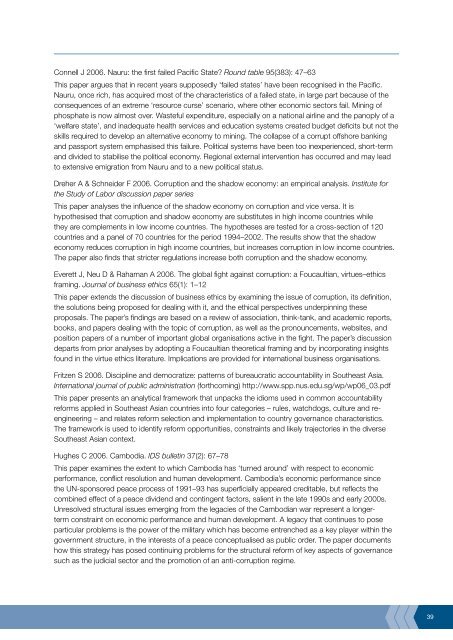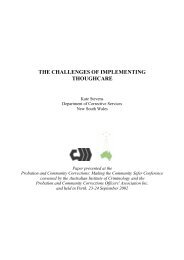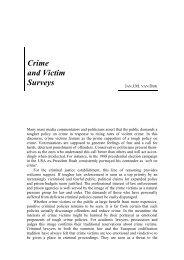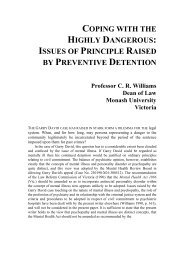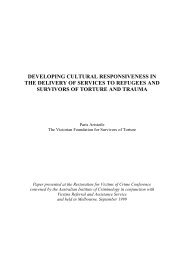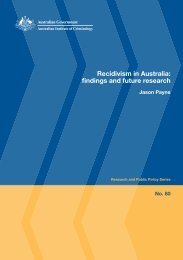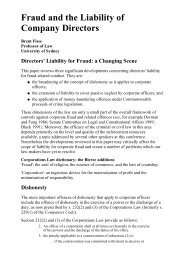Review of anti-corruption strategies Rob McCusker - Australian ...
Review of anti-corruption strategies Rob McCusker - Australian ...
Review of anti-corruption strategies Rob McCusker - Australian ...
Create successful ePaper yourself
Turn your PDF publications into a flip-book with our unique Google optimized e-Paper software.
Connell J 2006. Nauru: the first failed Pacific State? Round table 95(383): 47–63<br />
This paper argues that in recent years supposedly ‘failed states’ have been recognised in the Pacific.<br />
Nauru, once rich, has acquired most <strong>of</strong> the characteristics <strong>of</strong> a failed state, in large part because <strong>of</strong> the<br />
consequences <strong>of</strong> an extreme ‘resource curse’ scenario, where other economic sectors fail. Mining <strong>of</strong><br />
phosphate is now almost over. Wasteful expenditure, especially on a national airline and the panoply <strong>of</strong> a<br />
‘welfare state’, and inadequate health services and education systems created budget deficits but not the<br />
skills required to develop an alternative economy to mining. The collapse <strong>of</strong> a corrupt <strong>of</strong>fshore banking<br />
and passport system emphasised this failure. Political systems have been too inexperienced, short-term<br />
and divided to stabilise the political economy. Regional external intervention has occurred and may lead<br />
to extensive emigration from Nauru and to a new political status.<br />
Dreher A & Schneider F 2006. Corruption and the shadow economy: an empirical analysis. Institute for<br />
the Study <strong>of</strong> Labor discussion paper series<br />
This paper analyses the influence <strong>of</strong> the shadow economy on <strong>corruption</strong> and vice versa. It is<br />
hypothesised that <strong>corruption</strong> and shadow economy are substitutes in high income countries while<br />
they are complements in low income countries. The hypotheses are tested for a cross-section <strong>of</strong> 120<br />
countries and a panel <strong>of</strong> 70 countries for the period 1994–2002. The results show that the shadow<br />
economy reduces <strong>corruption</strong> in high income countries, but increases <strong>corruption</strong> in low income countries.<br />
The paper also finds that stricter regulations increase both <strong>corruption</strong> and the shadow economy.<br />
Everett J, Neu D & Rahaman A 2006. The global fight against <strong>corruption</strong>: a Foucaultian, virtues–ethics<br />
framing. Journal <strong>of</strong> business ethics 65(1): 1–12<br />
This paper extends the discussion <strong>of</strong> business ethics by examining the issue <strong>of</strong> <strong>corruption</strong>, its definition,<br />
the solutions being proposed for dealing with it, and the ethical perspectives underpinning these<br />
proposals. The paper’s findings are based on a review <strong>of</strong> association, think-tank, and academic reports,<br />
books, and papers dealing with the topic <strong>of</strong> <strong>corruption</strong>, as well as the pronouncements, websites, and<br />
position papers <strong>of</strong> a number <strong>of</strong> important global organisations active in the fight. The paper’s discussion<br />
departs from prior analyses by adopting a Foucaultian theoretical framing and by incorporating insights<br />
found in the virtue ethics literature. Implications are provided for international business organisations.<br />
Fritzen S 2006. Discipline and democratize: patterns <strong>of</strong> bureaucratic accountability in Southeast Asia.<br />
International journal <strong>of</strong> public administration (forthcoming) http://www.spp.nus.edu.sg/wp/wp06_03.pdf<br />
This paper presents an analytical framework that unpacks the idioms used in common accountability<br />
reforms applied in Southeast Asian countries into four categories – rules, watchdogs, culture and reengineering<br />
– and relates reform selection and implementation to country governance characteristics.<br />
The framework is used to identify reform opportunities, constraints and likely trajectories in the diverse<br />
Southeast Asian context.<br />
Hughes C 2006. Cambodia. IDS bulletin 37(2): 67–78<br />
This paper examines the extent to which Cambodia has ‘turned around’ with respect to economic<br />
performance, conflict resolution and human development. Cambodia’s economic performance since<br />
the UN-sponsored peace process <strong>of</strong> 1991–93 has superficially appeared creditable, but reflects the<br />
combined effect <strong>of</strong> a peace dividend and contingent factors, salient in the late 1990s and early 2000s.<br />
Unresolved structural issues emerging from the legacies <strong>of</strong> the Cambodian war represent a longerterm<br />
constraint on economic performance and human development. A legacy that continues to pose<br />
particular problems is the power <strong>of</strong> the military which has become entrenched as a key player within the<br />
government structure, in the interests <strong>of</strong> a peace conceptualised as public order. The paper documents<br />
how this strategy has posed continuing problems for the structural reform <strong>of</strong> key aspects <strong>of</strong> governance<br />
such as the judicial sector and the promotion <strong>of</strong> an <strong>anti</strong>-<strong>corruption</strong> regime.


